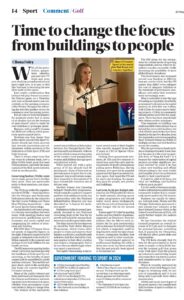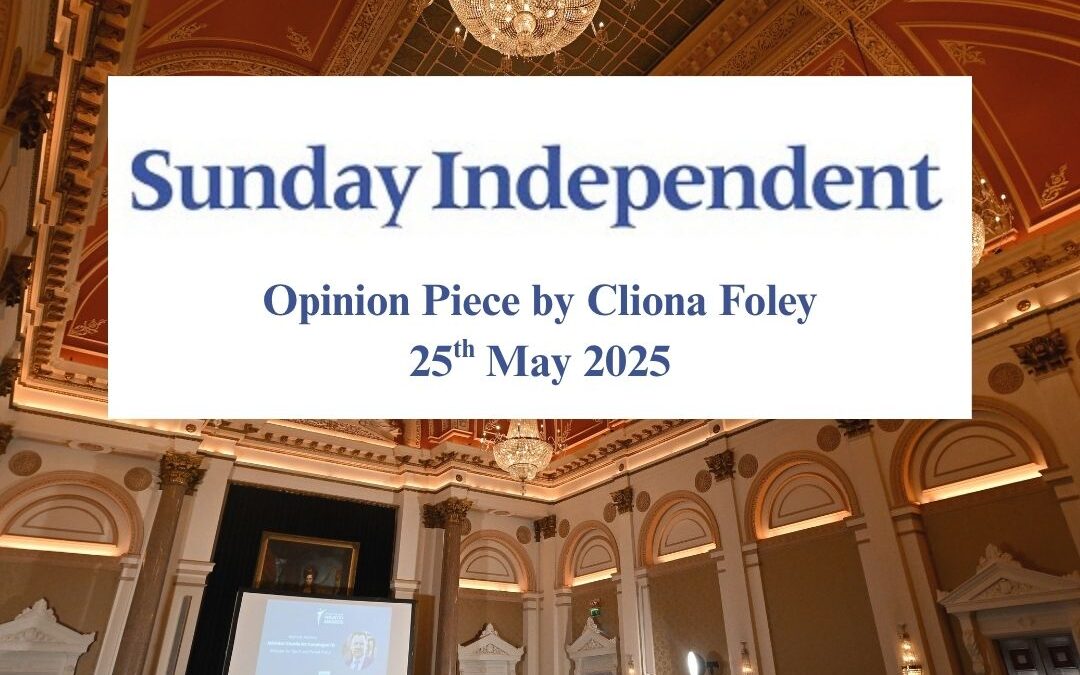Sunday Independent, 25th May 2025, by Cliona Foley
With all the petrodollars, gargantuan salaries, pay-per-view TV deals and prize pots sloshing around professional sport right now, it is easy to feel like business’ is becoming the new dirty word of this arena. Last week’s confirmation that Ireland will play France in a men’s Six Nations game on a Thursday next year so broadcasters can concentrate on the opening ceremony of the Winter Olympics the following day feels like another victory for commerce over the paying punter. It is all a far cry from the jumpers for goalposts purity that so many of us idealise and yet the business of sport doesn’t need to stand for over-inflation or grotesque greed.
Business, with a small ‘b’, remains the lifeblood without which grassroots sports cannot thrive. Nowhere was that clearer than at the eighth annual Irish Sport Industry Awards last week, an event that rewards innovation and collaboration within members of the Federation of Irish Sport (FIS) and Irish business.
There is always some irony that the venue is a former bank, now a glitzy Dublin hotel, given that most of those present, especially the many captains of the Irish sports industry, work in not-for-profits.
Governing bodies (NGBs) exist not to make money but to further their sport. They are answerable solely to their members, not share holders. The FIS is an umbrella organisation for 81 NGBs — from big hitters like the Olympic and Paralympic Federations down to the minnows like the Coarse Fishing and Horse
Shoe Pitching Associations — plus 29 Local Sports Partnerships. An independent advocacy group, it is the key intermediary between many Irish sporting bodies and government, publicising sport’s economic and social capital and campaigning for reform of structures and funding.
FIS CEO Mary O’Connor threw out plenty of impactful figures on the night. Irish sport employs 64,000 people, is estimated to be worth €3.7 billion annually to the economy and savings of over half a billion for our health services. The FIS represents sporting bodies whose 1.47m club members provide the backbone of Irish sport by volunteering, so the benefits of sport cannot just be quantified by profit and loss columns. “Beyond the balance sheet, sport is the social glue that keeps our country together,” O’Connor stressed.
Many of the night’s winners put flesh and blood and humanity into the cheques and balances, hammering home how investment in sport, whether from government or private industry, helps to change lives. The winner of the inclusivity award was a brilliant collaboration between the Donegal Sports Partnership and local domestic violence services which is empowering some of the county’s most marginalised women and children through sport and physical activity.
What started out with a pilot group of 12 has already had 88 participants. Many of them had no previous access to sport due to cost, transport, fear or self-esteem issues. How impactful is this initiative? It has a remarkable retention rate of 100 per cent. Another winner was Canoeing Ireland’s ‘PaddleAble’ programme, which trains its coaches to support paddlers with additional needs, has a partnership with the National Rehabilitation Hospital and was described as “a beacon for inclusive sport.”
Badminton Ireland seemed genuinely shocked to win National Governing Body of the Year for its growth and inclusivity among ethnic minorities and first-generation Irish.
The Mayo Sports Partnership won an award for their Better Balance Programme, which trains older people to retain and improve their balance; a collective, practical health initiative that first started in Cork, now applies in four other counties and targets a demographic that is far too often an afterthought when
ever sport is mentioned.
The night’s Outstanding Achievement award went to Matt English who recently stepped down after 17 years as CEO of Special Olympics Ireland. Getting three government ministers, 20 TDs and five senators to attend was quite the catch and demonstrative of sport’s phenomenal pulling power. Politicians, like big
business, love sport for its populist appeal and feel-good occasions but, once again, they heard the FIS ask for more core funding; the money that pays for people, not pitches and buildings.
Last year, in its pre-budget submission, the FIS pleaded for this to be ‘multi-annual’, allowing sports to plan programmes and recruit talent much more strategically with the security of knowing what their budget will be for several years. It also sought VAT relief for sporting bodies and tax relief for donations;
suggested an Employee Exercise Scheme (like the bike-to-work initiative but for gym membership) and an increase in Ireland’s betting levy which, it suggested, could be ring-fenced to create the kind of multi-sport, community facilities that operate so well in other countries.
The Government agreed to multi-annual funding, but while a three-year cycle has been posited that has not actually been agreed or formalised yet.
The FIS pleas for tax exemptions for certain levels of sporting organisations and tax relief on donations was also successful, vitally increasing the possibility of more philanthropic donations. The Government also increased overall core funding in 2024 by four per cent to €31m, but the FIS argues that didn’t even mitigate the cost of rampant inflation or the standards of governance, compliance and safety their members must increasingly meet. What is noticeable is how this type of funding is completely dwarfed by government’s allocations for capital projects. In 2024 this was €429m, with €173m for major sports building projects, €230m to community infrastructures and €26m for equipment. There has been surprisingly little debate on this imbalance.
That emphasis on building was understandable when Ireland was so behind the curve with facilities, but a lot of bricks and pitches have been funded in the last two decades, from the impressive and ever-expanding Sport Ireland Campus in Dublin to multiple pitches and club facilities across the country.
Why the government funds facilities so disproportionately is not clear. Is it because it is the most measurable form of ‘bang for buck’? Is it because the construction of capital projects provides significant revenue returns? Or could it be that a shiny new building and official ribbon-cutting is the most visible and tangible proof of a politician’s loyalty to their constituents?
It might be a bit of all three, but what are buildings and facilities without great people? It is the work of visionary people, creative collaborations and invaluable
community leaders that is consistently showcased at the FIS awards. Business can equally be visionary. Just last week, Allianz and the Olympic Federation announced a new schools tour’ initiative at the Sport Ireland Campus which, in the wake of record success in Paris, will surely further inspire the nation’s children. Yet last December the Judicial Council proposed an overall increase of 16.7 per cent in damages for personal injuries, something that, if passed in the Oireachtas, will directly affect sports clubs and organisations.
The FIS feels strongly that it’s time for the government to invest more in people; to help NGBs harvest the compost gold that grows every Irish sport from the ground up (volunteers) and develop, funnel and retain their top talent (coaches and administrators) in high performance. When it recently surveyed its members about their biggest challenges in retaining staff, 83 per cent of respondents said it is not being able to provide them with a pension plan.
All this and much more is part of the great tapestry, but complicated daily business at sport’s coalface in this country.
GOVERNMENT FUNDING TO SPORT IN 2024
●- €230m Community Sport Facilities Fund (CSFF, for facilities & equipment) *
● ●- €173m Large Scale Sport Infrastructure Fund (LSSIF)*
● ● – €28.7m Core Funding (€17.3m national governing bodies, €11.4m Local Sports Partnerships).
● ●- €27m High Performance Sport
● ● – €6m Dormant account funding to other initiatives
● ●- €4m Women in sport
* Both of these figures cover more than one year. The Department says the current focus is on delivering projects already approved and that the next
round of funding should be announced in 2026.
**The Federation of Irish Sport also received €135,

